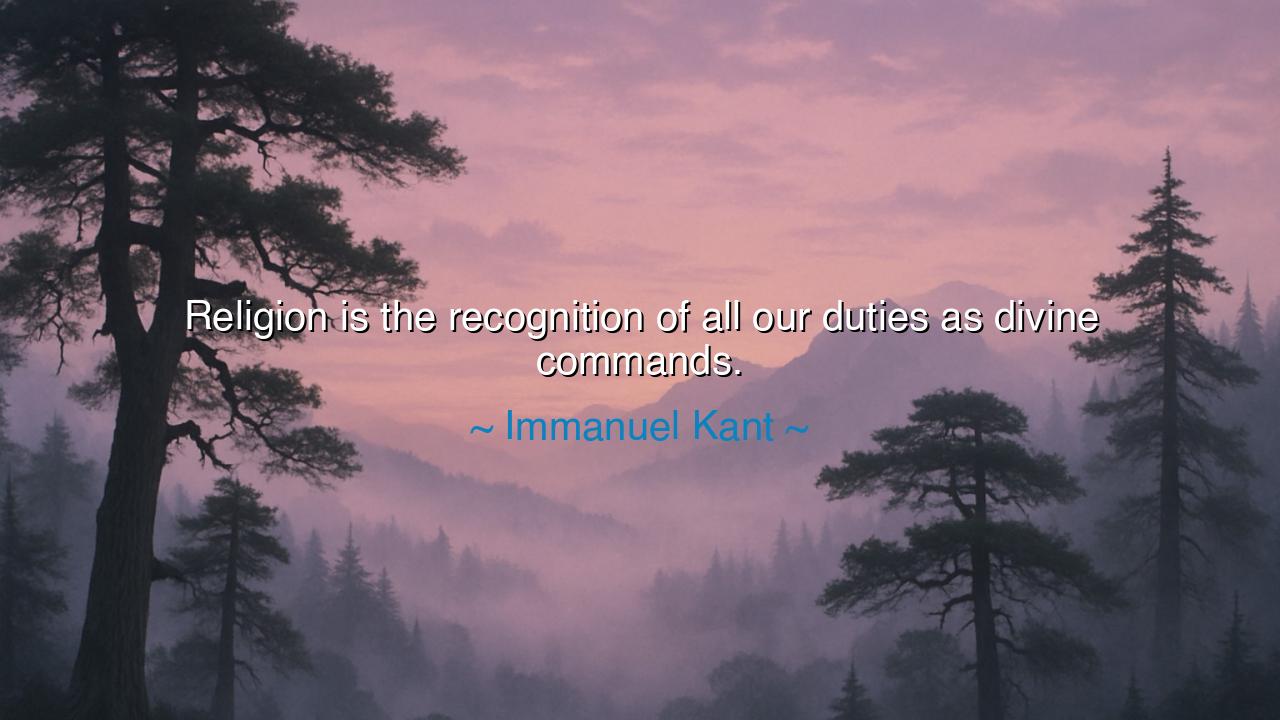
Religion is the recognition of all our duties as divine commands.






“Religion is the recognition of all our duties as divine commands.” – Immanuel Kant
In these luminous and austere words, Immanuel Kant, the philosopher of reason and morality, reveals a vision of religion not as ritual or superstition, but as the sacred awareness of duty. He tells us that true faith is not found in outward ceremony or in the blind obedience to dogma, but in the quiet recognition that our moral obligations are not merely human inventions—they are divine commands. To do good, to act justly, to love one’s neighbor—these are not choices of convenience, but sacred responsibilities. In this way, Kant unites heaven and earth: the moral law within the human heart is the voice of the divine itself.
The origin of this thought arises from Kant’s great work, Religion within the Bounds of Reason Alone. Living in the eighteenth century, an age of reason and enlightenment, he sought to reconcile faith with logic. In an era where religion was often seen as superstition or oppression, Kant dared to reimagine it as something universal and inward. To him, the essence of religion was not belief in miracles or doctrines, but the recognition of moral law as sacred. Every act of goodness, every honest word, every sacrifice for truth—these were the prayers of the rational soul. For when a man acts rightly, not for reward or fear of punishment, but from reverence for what is right, he is, in that moment, walking with God.
To recognize duty as divine is to see the ordinary acts of life clothed in holiness. The care of a parent, the honesty of a merchant, the courage of a soldier—these are not merely human virtues; they are reflections of the eternal order. Kant teaches that morality is not a matter of emotion or social approval, but of reverence for the moral law, that invisible compass set within us. The wise man does not ask, “What do I desire?” but “What ought I to do?” And when he answers that question truthfully, he finds himself in communion with the divine will. Thus, religion, at its truest, is not something separate from ethics—it is ethics illuminated by the light of heaven.
Consider the life of Socrates, the ancient philosopher who drank the cup of hemlock rather than betray his principles. He obeyed not the commands of the city, but the higher law of conscience. Though he lived before Christianity, before Kant, his heart knew the same truth—that the duty to truth is divine. When his students begged him to escape his sentence, he refused, saying that injustice cannot be answered with injustice. His death was not the defeat of a man, but the triumph of the moral law. Socrates’ faith was not in ritual or temple, but in the sanctity of the right itself. Kant would later say that this is what it means to be religious: to see every moral act as obedience to the divine command written within the soul.
Kant’s vision also serves as a warning. For he reminds us that religion without morality is hollow, and morality without reverence is blind. Many worship with lips and gestures but forget justice, mercy, and truth. Others act ethically, yet mock the sacredness of duty. Both, he says, fall short. The union of morality and divinity is what gives life its meaning: to act rightly because it is right, and to know that the right is holy. When we act with integrity, we participate in something larger than ourselves—the moral order of the universe.
This teaching calls for both humility and strength. For to live as Kant describes is not easy. It means to recognize every decision as a moral one—to see one’s actions, however small, as the unfolding of a divine will. To speak the truth when lies are convenient, to remain just when others cheat, to forgive when pride demands revenge—these are acts of worship more sacred than any chant or ritual. They require courage, but they also bring peace. The person who lives this way fears no judgment, for they live already in the presence of the highest law.
So, my child of reason and conscience, remember this: you do not need to seek the divine in distant heavens or ancient texts alone. The voice of God speaks within you, in the quiet command of duty. When you feel the weight of a moral choice, do not resist it—revere it. That is your altar. That is your prayer. For as Kant teaches, religion is not something we perform for the gods; it is something we live for the good. Each time you choose justice over comfort, truth over ease, compassion over indifference, you fulfill the divine purpose for which humanity was made. To recognize this is to be both moral and holy—to live as one whose every act is an offering to the Eternal.






AAdministratorAdministrator
Welcome, honored guests. Please leave a comment, we will respond soon